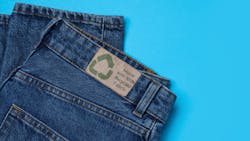Clothes made from carbon emissions may be coming to a Walmart near you soon
Everyone from large manufacturing companies to individual consumers is looking for new and innovative ways to be more sustainable and cut costs. At first glance, this may seem like a daunting task, but what if something as potentially harmful as CO2 emissions could be converted into a fashionable garment? It might sound unrealistic, but one company is making it happen, and the world’s largest retailer could soon become their biggest client.
Neeka and Leila Mashouf grew up with a love of nature, science, and fashion. The California natives were inspired by their surroundings and their family’s fashion business to discover new ways to make sustainable fabrics. The twin sisters founded Rubi Laboratories in 2021 with the intent to make cellulosic textiles from 100% carbon dioxide. According to the company, CO2 emissions are diverted into the Rubi system instead of being released into the air. The CO2 is then converted into pure cellulose pulp using enzymes. From there, the pulp is spun into fibers, yarn, and textile that can be used in the production of various fabrics and clothes. The company claims that one pair of jeans produced using this method prevents 20 bathtubs full of CO2 from entering the atmosphere, and the garment is biodegradable at the end of its life. When compared to other textiles, the company says that their material costs less, is carbon negative, and is water and land neutral.
In a Vogue Business article, Rubi CEO Neeka Mashouf told author Rachel Cernansky, “The fashion industry and supply chain need to be reinvented. I don't believe we’re going to achieve our big sustainability goals by iteratively improving the technologies we use today. Those technologies are inherently tied to the degradation of the planet. And moving away from using so much land and water for agriculture is going to be really important. What we're really looking at building at Rubi is an entire reinvention of the way that supply chains work.”
Recently, Rubi announced that it will be partnering with Walmart to bring its innovative ideas and message to the masses. The pilot project will utilize emissions from manufacturers and facilities in the Walmart supply chain and convert them into different garments. During the pilot, both companies will explore how this green technology could be utilized on a large scale, as well as testing the performance and durability of clothing pieces created through the carbon capture process. If the pilot is successful, an apparel collection at the world-wide retailer is possible.
In a recent article, Andrea Albright, EVP of Sourcing at Walmart, said, “When I toured the Rubi facility earlier this year, I got to see their carbon capture process firsthand, and it felt like magic, this creation of something seemingly out of thin air. The science, though, is more exciting. It started with trees. Rubi founders Neeka and Leila Mashouf took inspiration from how trees “eat” CO2 to create needed cellulose to grow and have figured out a way to mimic this natural process in the lab. Their patent-pending process, like trees, captures and converts carbon emissions, spinning the resulting cellulose into something we all need: fabric. The final products are carbon-negative, resource-neutral textiles that can be used for clothing and other materials.”
About the Author
Alexis Gajewski
Senior Content Strategist
Alexis Gajewski has over 15 years of experience in the maintenance, reliability, operations, and manufacturing space. She joined Plant Services in 2008 and works to bring readers the news, insight, and information they need to make the right decisions for their plants. Alexis also authors “The Lighter Side of Manufacturing,” a blog that highlights the fun and innovative advances in the industrial sector.
